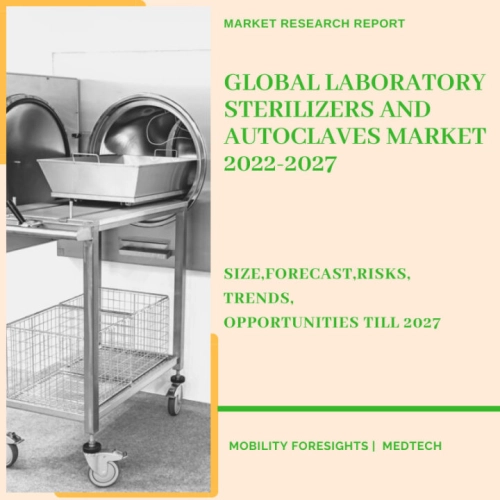
- Get in Touch with Us

Last Updated: Apr 25, 2025 | Study Period: 2022-2027
Pharmacological ingredients, surgical instruments, as well as other laboratory equipment are disinfected or sterilised using laboratory sterilisers.

Because medical equipment and other instruments become polluted after each use require constant decontamination, these solutions are an essential part of any hospital or medical clinic's infections control strategy. Depending on the end-user and purpose, laboratory sterilisers show differences, design, and technologies used.
Depending on the intended and purpose, scientific sterilisers vary in function, structure, and technologies used. In dentistry clinics, small countertop heat sterilisers are prevalent, while big industrial steam autoclaves are employed in large healthcare institutions.
The rise in nosocomial pathogens, also known as hospital-acquired infections, is expected to fuel the laboratory sterilisers segment is expected to register. Because of superior reimbursement policies, strong awareness levels, sufficient government assistance, and a robust regulatory environment in the region, Europe is likely to follow Central America in terms of worldwide market share.
The global laboratory sterilisers market is being boosted by rising disposable incomes and strong economic performance. The market in Asia Pacific is expected to grow rapidly as well.
In dentistry clinics, small tabletop heat sterilisers are prevalent, while big industrial steam autoclaves are employed in large healthcare institutions.
The demand for versions that require minimal human input while still being successful is extremely strong. As a result, several companies are attempting to develop solutions that can function with a wide range of instruments and medical devices.
Furthermore, developments in the field of microbiology, combined with innovation, are expected to drive the global laboratory sterilisers market, leading to the desire for high-impact sterilisers.
Tuttnauer Inc. is a prominent developer of the latest integrated technologies focusing on better smarter sensing and imaging technology focused on spectrum of medical systems for the future.
The Biohazard autoclaves with double door pass-through arrangements that ensure a tightly sealed boundary among users with expertise overall risk regions, meeting Bio-Safety Level (BSL) regulations for BSL3 and BSL4 facilities.
In addition, autoclaves meet the sterilisation standards for research and experimental equipment used with animals, eliminating cross-transmission and exposure to pathogens in faeces and biological fluids.
CSS provide pixel-level technical breakthroughs that allow diagnostic imaging technology makers, investigators, and clinicians to capture higher detailed images.
The Autoclaves are ideal for use in animal experimentation, biological sciences, food standards, including health research. Choose from a choice of sizes and customizable menu settings for pre-vacuum or gravitational operations in stainless steel or nickel-clad steel vessels.
The Tower Model takes up 35% less space with two sterilisers placed side by side, with innovative recessed and cabinet designs allowing for additional more space savings. The Tower Model will also lead to significant savings by having functional.
| Sl no | Topic |
| 1 | Market Segmentation |
| 2 | Scope of the report |
| 3 | Abbreviations |
| 4 | Research Methodology |
| 5 | Executive Summary |
| 6 | Introduction |
| 7 | Insights from Industry stakeholders |
| 8 | Cost breakdown of Product by sub-components and average profit margin |
| 9 | Disruptive innovation in the Industry |
| 10 | Technology trends in the Industry |
| 11 | Consumer trends in the industry |
| 12 | Recent Production Milestones |
| 13 | Component Manufacturing in US, EU and China |
| 14 | COVID-19 impact on overall market |
| 15 | COVID-19 impact on Production of components |
| 16 | COVID-19 impact on Point of sale |
| 17 | Market Segmentation, Dynamics and Forecast by Geography, 2022-2027 |
| 18 | Market Segmentation, Dynamics and Forecast by Product Type, 2022-2027 |
| 19 | Market Segmentation, Dynamics and Forecast by Application, 2022-2027 |
| 20 | Market Segmentation, Dynamics and Forecast by End use, 2022-2027 |
| 21 | Product installation rate by OEM, 2022 |
| 22 | Incline/Decline in Average B-2-B selling price in past 5 years |
| 23 | Competition from substitute products |
| 24 | Gross margin and average profitability of suppliers |
| 25 | New product development in past 12 months |
| 26 | M&A in past 12 months |
| 27 | Growth strategy of leading players |
| 28 | Market share of vendors, 2022 |
| 29 | Company Profiles |
| 30 | Unmet needs and opportunity for new suppliers |
| 31 | Conclusion |
| 32 | Appendix |